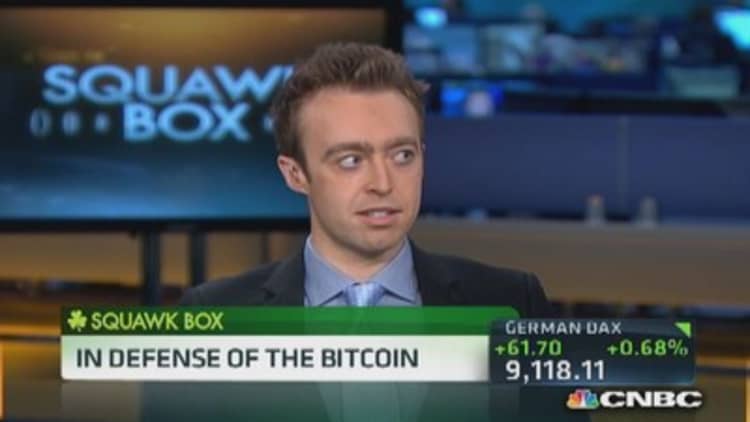
Bitcoin has been one of the hottest topics of the past year -- in 2013 its value rose more than fiftyfold. But while the conversation around the cryptocurrency has varied from price volatility to its legitimacy, many overlooked bitcoin's key innovation: the "block chain."
The block chain is a public ledger of all bitcoin transactions. Transactions are verified on a peer-to-peer network when computers running bitcoin software – or "nodes" – reach a consensus, which prevents double spending or forgery. The block chain is the key to keeping bitcoin transparent, decentralized and secure; it ensures that everyone holding bitcoins has an exact copy of this ledger and that all transactions are recognized and verified by the peer-to-peer network.
(Read more: Bitcoin steps up from sandwiches to villas)
More importantly -- the block chain removes the need for a third-party.
Bitcoin allows for the transfer of money without using a third-party intermediary. Through the block chain the decentralized peer-to-peer network verifies the transaction without imposing hefty transaction fees.
"As far as I know, the block chain is the only method to achieve global consensus which isn't based on trust [of an external organization]," said Alex Mizrahi, founder and lead developer of ChromaWallet.
"History shows that even entities which are seen as being trustworthy -- banks, governments -- can sometimes turn to deception as they have interests of their own or can fall victim to some kind of attack. So the block chain can succeed where other approaches fail," he said.
Secure communication
While the financial implications of cutting out third-party intermediaries and reducing fees are appealing, the block chain has more to offer.
Bitmessage, for instance, allows users to send messages over a secure network by using a peer-to-peer communications protocol similar to bitcoin's transaction and block transfer system. Messages sent using the protocol are encrypted, while users sending the messages are masked and cannot be emulated or hacked. The system offers a more secure alternative to traditional e-mail platforms, and could protect against snooping or spying like that undertaken by the National Security Agency.
(Read more: Back to work at bitcoin's embattled Mt.Gox)
Twister, a peer-to-peer microblogging platform based on similar protocols, helps prevents censorship, while end-to-end encryption on direct messages prevents spying.
Smart property
Another use of the block chain would be smart property. The concept of applying a secondary value to bitcoins through colored "coins" is being developed for this purpose.

ChromaWallet is working on software that uses the colored coin concept. According to Mizrahi, the central idea behind smart property is that the current owner can be identified through the blockchain. The benefit would be the elimination of paperwork and the use of third parties in various situations where contracts are required.
He gives the example of a secondary market for time shares: "As far as I know, in many cases people have to conduct transactions through a broker, who has a lot of control, thus this market can be rigged" he told CNBC.
"If timeshare ownership were represented using colored coins, it would make transactions directly between individuals possible, thus making this market more open. And this means better price discovery and greater confidence, as people will see that they aren't overpaying for these timeshares," he added.
(Read more: Mind your wallet: why the underworld loves bitcoin)
Ethereum, another cryptographic ledger, offers a platform and programming language that goes beyond the concept of the block chain so that just about anything can be decentralized, secured and traded: voting, domain names, financial exchanges, crowd funding, company governance, contracts, intellectual property, and even smart property.
What are the hurdles?
With many people still trying to wrap their heads -- and become confident in using -- bitcoin, widespread adoption of applications that incorporate the block chain is unlikely. Until then, developers may need to aim for creating better user experiences according to Mike Hearn, a bitcoin developer.

"I think right now we need to establish better documentation and best practices. A lot of people experimenting in this space produce apps with poor user experiences, probably because they don't know how to make better ones. I'm hoping some examples here will raise the bar and light the way," he told CNBC.
Another issue, according to ChromaWallet's Mizrahi, is that all nodes need to verify transactions regardless of their size, which is potentially inefficient.
"When someone buys a cup of coffee, he doesn't really need full power of a decentralized, trustless network," he said. "We need to design a solution which would let small transactions to be processed without burdening the decentralized network."
(Read more: How to make money from bitcoin)
Financial institutions are among the cryptocurrency's biggest skeptics, likening bitcoin to a commodity or speculative financial instrument. Yet in a note dated March 11th, Goldman Sachs analysts acknowledged that "more than taking off as a widely-used alternative currency, it is much more plausible that bitcoin eventually has a significant impact in terms of its innovation on payments technology, by forcing existing players to adapt to it or coopt it."
However, the same note highlighted concerns about maintaining the block chain as it grows in size: "Whether maintenance of the block chain by the mining community will remain a reasonable task is also in doubt given the rapidly increasing length of the block chain, which increased to nearly 15 GB from 10 GB in just six months, and the rising complexity of it as it splits."
— By CNBC's John Phillips. Follow him on Twitter @J_Phillips_CNBC





